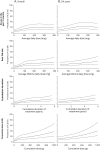Longitudinal analysis of impulse control disorders in Parkinson disease
- PMID: 29925549
- PMCID: PMC6059034
- DOI: 10.1212/WNL.0000000000005816
Longitudinal analysis of impulse control disorders in Parkinson disease
Abstract
Objective: To investigate the longitudinal dose-effect relationship between dopamine replacement therapy and impulse control disorders (ICDs) in Parkinson disease (PD).
Methods: We used data from a multicenter longitudinal cohort of consecutive patients with PD with ≤5 years' disease duration at baseline followed up annually up to 5 years. ICDs were evaluated during face-to-face semistructured interviews with movement disorder specialists. Generalized estimating equations and Poisson models with robust variance were used to study the association between several time-dependent definitions of dopamine agonist (DA) use, taking dose and duration of treatment into account, and ICDs at each visit. Other antiparkinsonian drugs were also examined.
Results: Among 411 patients (40.6% women, mean age 62.3 years, average follow-up 3.3 years, SD 1.7 years), 356 (86.6%) took a DA at least once since disease onset. In 306 patients without ICDs at baseline, the 5-year cumulative incidence of ICDs was 46.1% (95% confidence interval [CI] 37.4-55.7, DA ever users 51.5% [95% CI 41.8-62.1], DA never users 12.4% [95% CI 4.8-30.0]). ICD prevalence increased from 19.7% at baseline to 32.8% after 5 years. ICDs were associated with ever DA use (prevalence ratio 4.23, 95% CI 1.78-10.09). Lifetime average daily dose and duration of treatment were independently associated with ICDs with significant dose-effect relationships. Similar analyses for levodopa were not in favor of a strong association. ICDs progressively resolved after DA discontinuation.
Conclusion: In this longitudinal study of patients with PD characterized by a high prevalence of DA treatment, the 5-year cumulative incidence of ICDs was ≈46%. ICDs were strongly associated with DA use with a dose-effect relationship; both increasing duration and dose were associated with ICDs. ICDs progressively resolved after DA discontinuation.
Clinicaltrialsgov identifier: NCT01564992.
© 2018 American Academy of Neurology.
Figures



Comment in
-
Don't ask, don't tell: Impulse control disorders in PD.Neurology. 2018 Jul 17;91(3):107-108. doi: 10.1212/WNL.0000000000005806. Epub 2018 Jun 20. Neurology. 2018. PMID: 29925552 No abstract available.
References
-
- Evans AH, Strafella AP, Weintraub D, Stacy M. Impulsive and compulsive behaviors in Parkinson's disease. Mov Disord 2009;24:1561–1570. - PubMed
-
- Callesen MB, Weintraub D, Damholdt MF, Moller A. Impulsive and compulsive behaviors among Danish patients with Parkinson's disease: prevalence, depression, and personality. Parkinsonism Relat Disord 2014;20:22–26. - PubMed
-
- Weintraub D, Koester J, Potenza MN, et al. Impulse control disorders in Parkinson disease: a cross-sectional study of 3090 patients. Arch Neurol 2010;67:589–595. - PubMed
-
- Voon V, Fox SH. Medication-related impulse control and repetitive behaviors in Parkinson disease. Arch Neurol 2007;64:1089–1096. - PubMed
Publication types
MeSH terms
Substances
Associated data
LinkOut - more resources
Full Text Sources
Other Literature Sources
Medical
